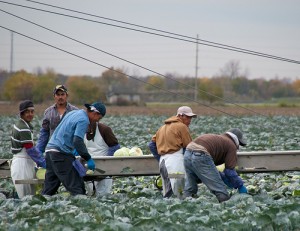Immigration, Elasticity and Why Americans Won't Pick Onions (Yet)
 Photo: Bob Jagendorf
Photo: Bob JagendorfA study released this week by NBER measures the elasticity of substitution between American workers and their immigrant counterparts — in non-economic speak, the study asks whether immigrants are good substitutes for equally skilled native workers.
While some comparisons remain murky, it appears that non-native workers are actually “perfect substitutes” for equally skilled native workers. The authors write:
In terms of the elasticity of substitution between equally skilled immigrants and natives, we conclude that the OP data, correctly analyzed, imply that the two groups are perfect substitutes. In fact, by using a statistically valid set of regression weights and by defining the earnings of a skill group as the mean log wage of the group (rather than the unconventional log mean wage used by OP), we find that the OP data reveal an effectively infinite substitution elasticity. The evidence thus implies that native workers are exposed to adverse effects from immigration-induced increases in labor supply.
The study sheds some light on the thinking behind (and backlash against) Alabama’s court-upheld crackdown on illegal immigrants. A recent New York Times article outlines the fallout in one town, describing Hispanic families leaving at night, pulling their kids out of school and selling fully furnished trailer homes for $1,000. Lawmakers cited the removal of illegal immigrants as a step towards giving jobs back to American “native”citizens, although a short-term labor shortage was expected.
Another Times article published this week, however, challenges the idea of “perfect substitutes” advanced by the NBER study and paints an alternate picture of the economic reasoning behind Alabama’s legislation. John Harold, a Colorado farmer profiled by the Times, tried to hire some unemployed Americans to work on his ranch and paid them a wage of $10.50 an hour, like the migrant workers he usually employs from the federal H-2A program (Colorado’s regular minimum wage is $7.36). The American workers quit, citing the labor as too hard – something that didn’t happen with the Mexican laborers Harold traditionally used.
Elasticity, it seems, has its limits. States that crack down on immigrants are likely facing an uncertain agricultural future, despite the economic downturn, for jobs that this era of American citizens still find too arduous. What Alabama sees as a short-term problem might be a much longer-term problem for the toughest kinds of labor, like farming. It is worth wondering, though, whether a few more years of economic hardship may change American attitudes towards what kind of work qualifies as too hard.

Comments